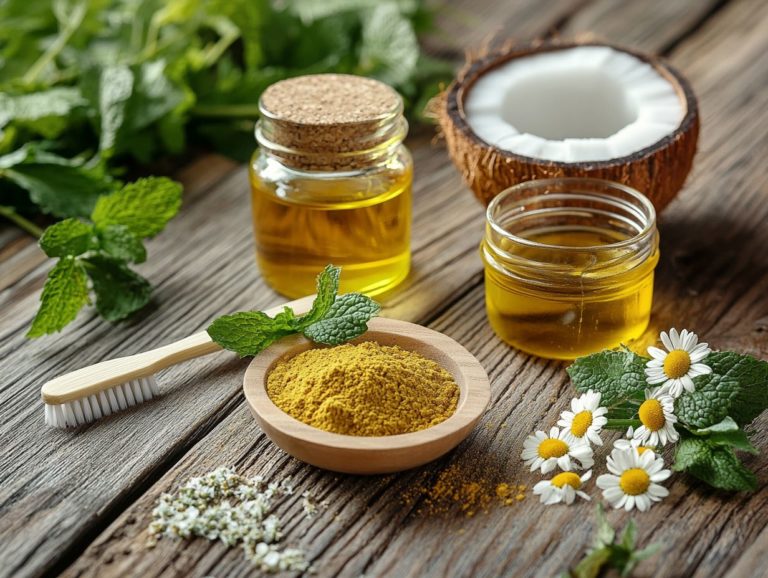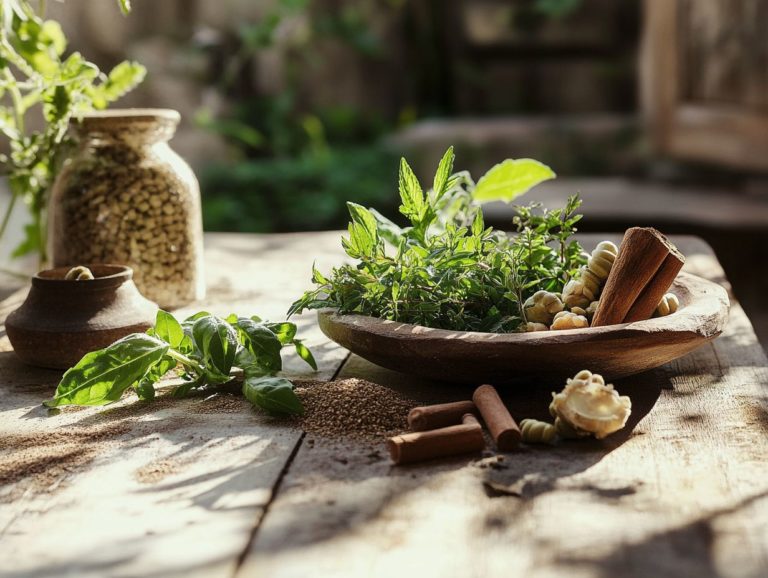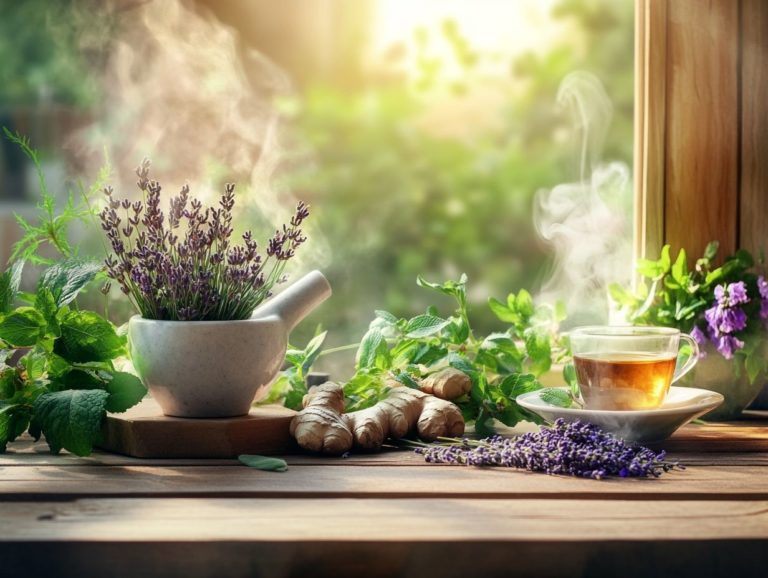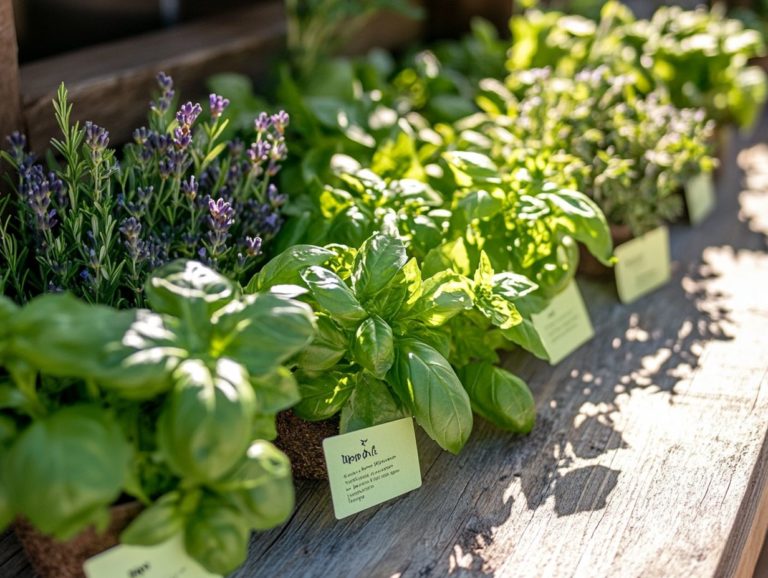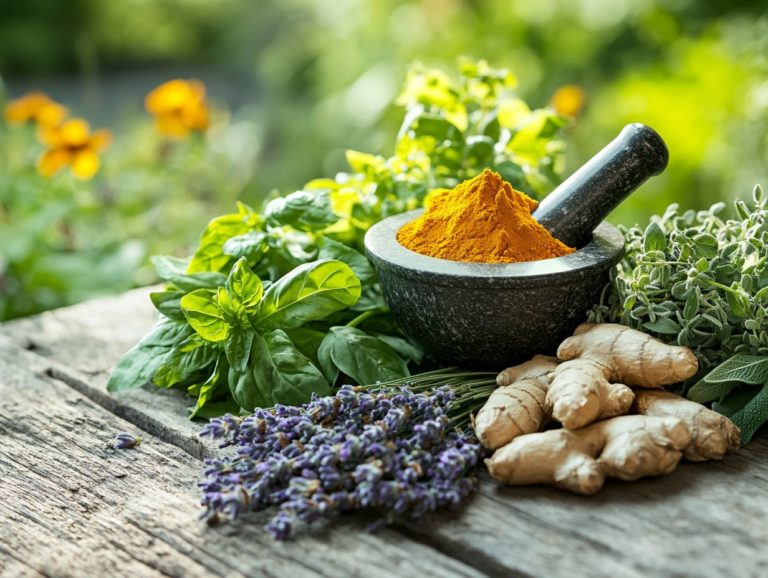Herbs for Anxiety: Natural Solutions and Benefits
Anxiety impacts millions, prompting many to seek effective relief.
This article delves into the causes and various types of anxiety, illuminating the natural herbs that can offer soothing benefits. You ll find insights into commonly used herbs, tips on how to seamlessly incorporate them into your daily routine, and essential precautions to keep in mind.
You will also discover lifestyle changes and techniques that can enhance your mental well-being. Unearth how nature can serve as a powerful ally in your journey to manage anxiety.
Contents
- Key Takeaways:
- Understanding Anxiety
- Natural Herbs for Anxiety Relief
- How to Incorporate Herbs into Your Routine
- Potential Interactions and Side Effects
- Other Natural Solutions for Anxiety
- Frequently Asked Questions
- What are the benefits of using herbs for anxiety?
- What are some natural solutions for anxiety using herbs?
- Are there any side effects of using herbs for anxiety?
- How do herbs for anxiety work?
- Can herbs for anxiety be used in combination with other treatments?
- What are some popular herbs for anxiety and how do I use them?
- Explore the Benefits of Herbs!
Key Takeaways:
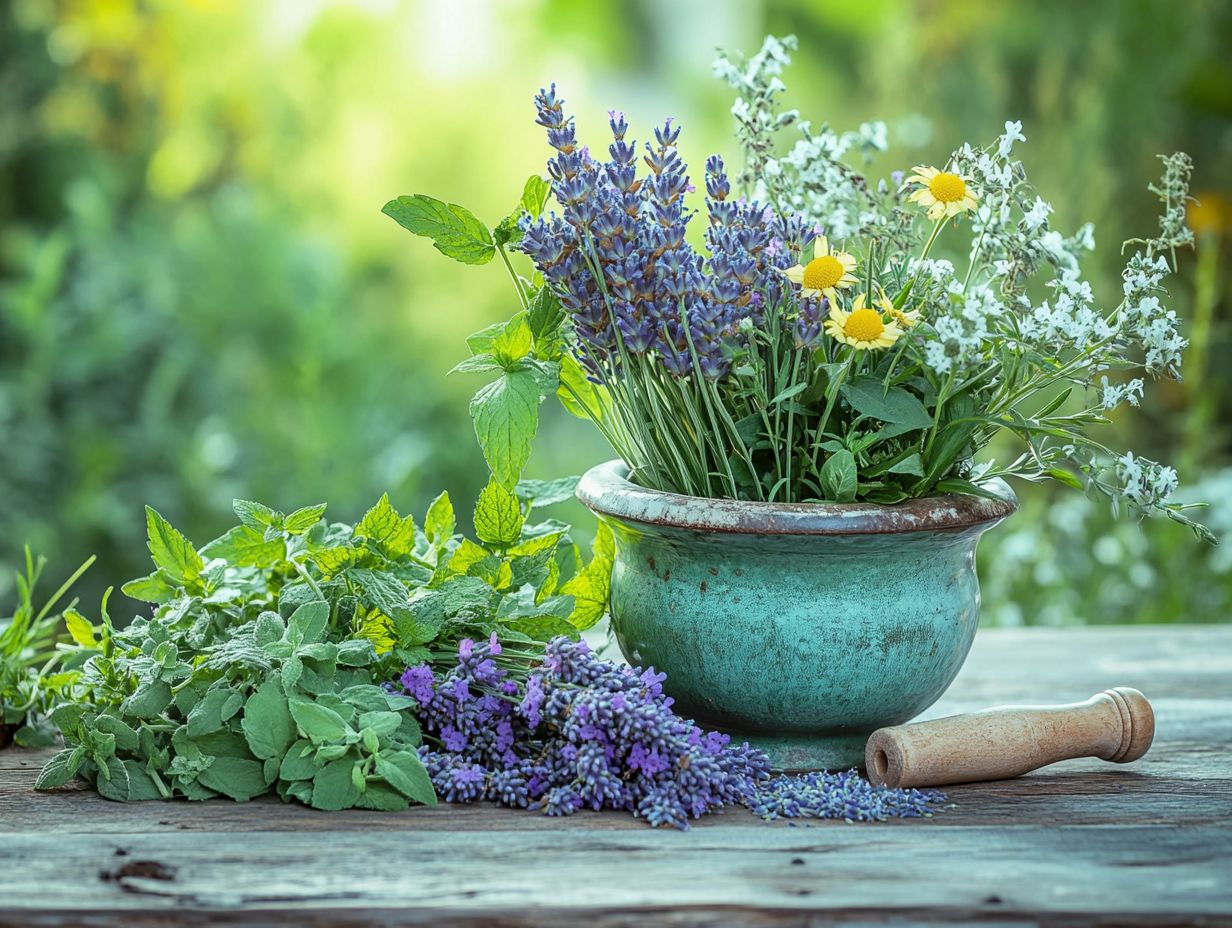
- Incorporating natural herbs into your routine can help alleviate anxiety. Some commonly used herbs include chamomile, lavender, and passionflower, which have calming and relaxing properties.
- Before incorporating herbs into your routine, it is important to understand the potential interactions and side effects. Always consult with a healthcare professional and follow recommended dosage guidelines.
- In addition to herbal remedies, making lifestyle changes and learning relaxation techniques can also help manage anxiety. These can include exercise, meditation, and reducing stress triggers in your daily life.
Understanding Anxiety
Anxiety is a complex mental health condition that encompasses a variety of symptoms, profoundly affecting your emotional well-being. It can present itself in many forms, such as generalized anxiety disorder and panic disorder, each bringing unique challenges and influencing your daily life.
Understanding its nuances is crucial for effective management and treatment.
Causes and Types of Anxiety
Anxiety can stem from a complex interplay of genetic, environmental, and psychological factors. A family history of anxiety can elevate your chances of developing anxiety disorders. Environmental stressors, like traumatic childhood experiences or high-pressure situations in adulthood, can trigger or intensify these conditions. Additionally, your lifestyle choices such as poor nutrition, lack of exercise, and inadequate sleep can significantly contribute to heightened anxiety levels.
Among the different types of anxiety, generalized anxiety disorder manifests as persistent and excessive worry, while panic disorder presents sudden, intense episodes of fear. To complement your treatment and coping strategies, consider exploring herbal tea for anxiety relief. By understanding these distinctions, you can better inform your approach to effective treatment.
Natural Herbs for Anxiety Relief
Natural remedies for anxiety have become increasingly popular as individuals seek effective alternatives to traditional medications. Discover how herbs like chamomile, lavender, and Kava can transform your anxiety relief!
These herbal solutions not only provide relief but also contribute positively to your overall mental health and emotional well-being.
Commonly Used Herbs and Their Benefits
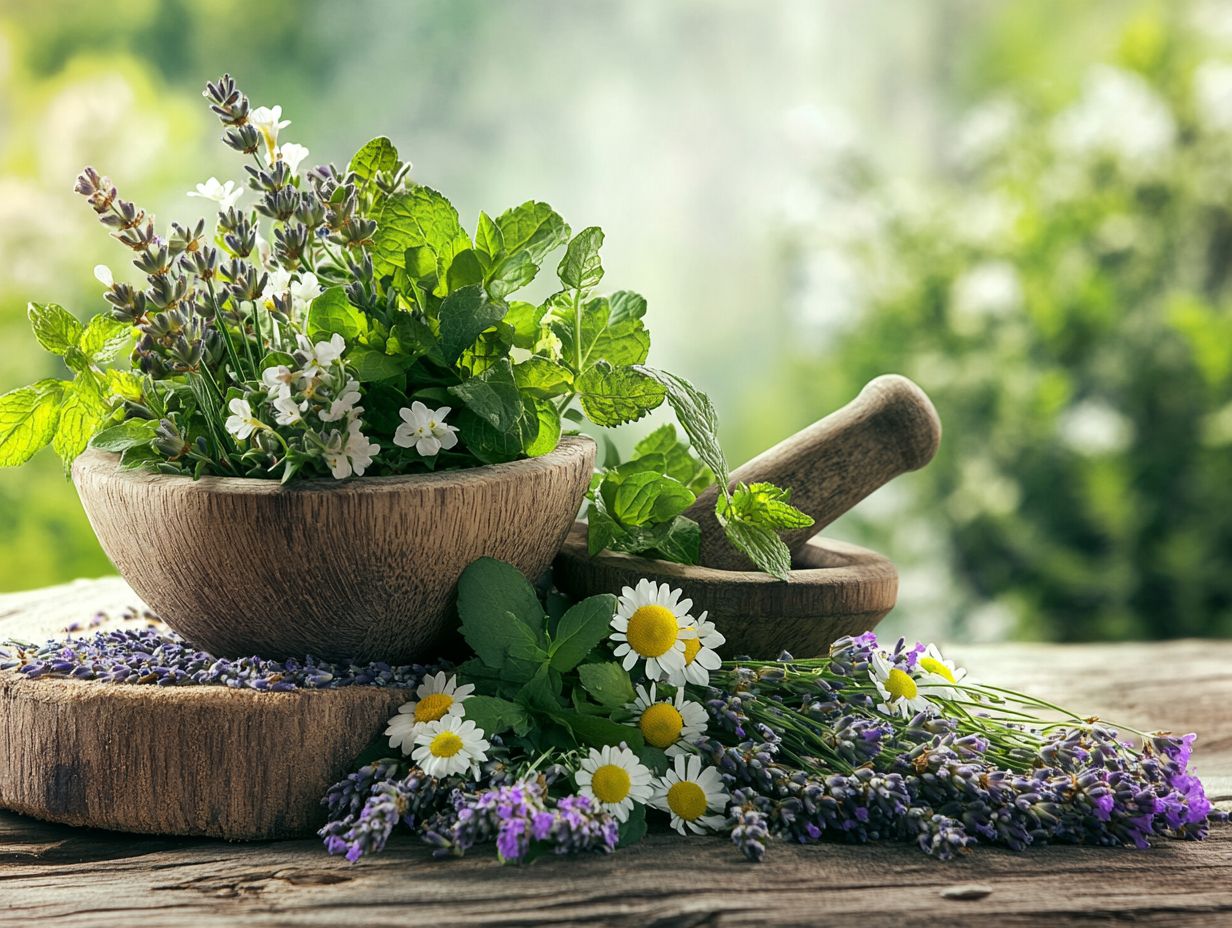
Several herbs are renowned for their calming effects, including chamomile, lavender, and Kava, each offering unique benefits for anxiety relief.
Chamomile, often savored as a soothing tea, has a rich history of promoting relaxation and enhancing sleep quality. Research suggests it might help lower anxiety levels by regulating stress hormones, making it a perfect addition to your evening routine. For more options, consider exploring the top herbs for managing stress effectively.
Lavender, with its enchanting aroma, is celebrated not just for its delightful fragrance but also for its remarkable ability to ease tension and anxiety. Studies indicate that inhaling lavender oil can significantly reduce stress and elevate your mood; it’s like a mini vacation for your senses. For those looking for more options, consider exploring 5 must-try herbs for stress management.
Kava, a traditional Polynesian herb, is lauded for its sedative properties. It effectively decreases anxiety while promoting a sense of calm, all without the drowsiness that often accompanies pharmaceuticals.
When combined, these herbs form a formidable natural arsenal for managing anxiety and enhancing your overall well-being.
Ready to embrace the calming power of nature? Start incorporating these herbs into your routine today!
How to Incorporate Herbs into Your Routine
Incorporating herbal remedies into your daily routine can be a seamless endeavor. This allows you to harness the soothing effects of nature in your pursuit of anxiety relief.
Whether through teas, supplements, or essential oils, it’s essential to understand the methods of consumption and appropriate dosages to achieve the best results.
Methods of Consumption and Dosage
There are various methods for consuming herbal remedies, each with specific dosage recommendations that ensure both safety and efficacy.
Teas provide a soothing avenue to experience the benefits of herbs, allowing for easy customization in both strength and flavor.
Capsules are a convenient, tasteless option, perfect for those with busy lifestyles. Tinctures offer concentrated extracts that are often recommended for quicker absorption into the bloodstream.
Essential oils are powerful alternatives commonly used in aromatherapy or topical applications. However, they require careful handling due to their potency. Adhering to safe dosage practices and personalizing your intake according to your health needs can lead to more effective results.
Potential Interactions and Side Effects
While many herbal remedies are often deemed safe, it’s crucial to remain vigilant about potential interactions and side effects that could arise from their use particularly when combined with other medications or supplements.
Precautions and Warnings
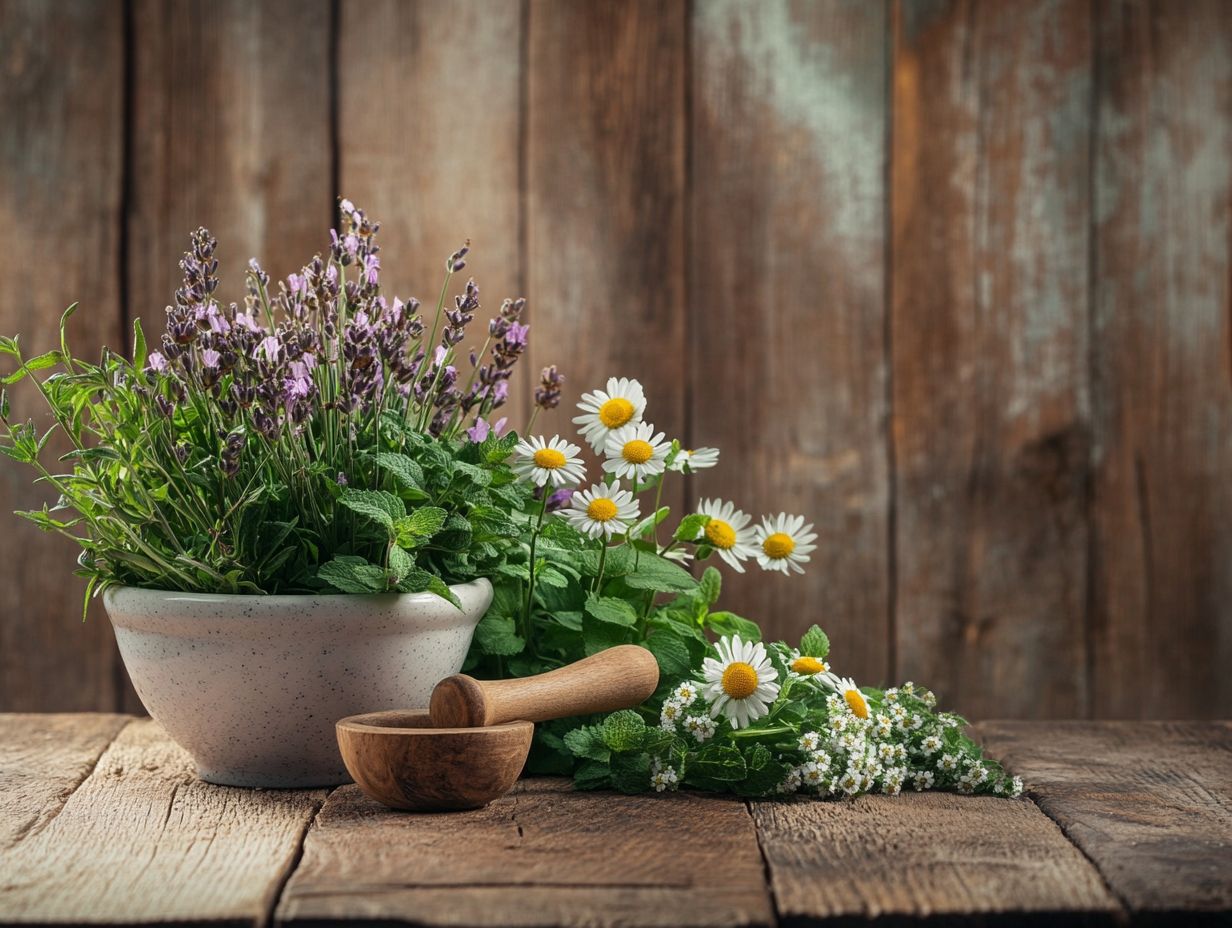
Taking precautions and heeding warnings is essential when considering herbal remedies for anxiety. These remedies may interact with other treatments and have their own side effects.
Recognizing that not every herb is suitable for everyone can make a big difference. If you have specific health conditions, like liver disease or if you re pregnant, extra caution is necessary.
For those taking medications that prevent blood clots or sedatives, certain herbal products might amplify or lessen the effectiveness of your medications, potentially leading to adverse reactions.
Consulting a healthcare provider before trying herbal remedies can offer valuable insights. Your safety matters, so don’t wait! Additionally, being aware of the origin and quality of the herbs you choose is crucial, as herbs that help with mood improvement can have varying levels of effectiveness and contaminants that pose serious health risks.
Other Natural Solutions for Anxiety
Beyond herbal remedies, you ll discover a range of natural solutions for anxiety that can beautifully complement traditional treatments. These methods not only offer additional avenues for stress relief but also enhance your overall emotional well-being.
Practices such as mindfulness meditation, engaging in regular exercise, and adopting effective coping strategies can significantly elevate your ability to manage anxiety.
Lifestyle Changes and Techniques
Implementing lifestyle changes and techniques can greatly enhance your ability to manage anxiety. These practical tools equip you to navigate daily challenges with confidence.
By committing to regular physical activity, you can naturally elevate your mood. Exercise releases those delightful endorphins known for their stress-relieving properties.
Embracing a balanced diet rich in whole foods not only fuels your body but also nurtures your emotional well-being.
Prioritizing sleep hygiene maintaining a consistent sleep schedule and establishing a calming bedtime routine can lead to more restorative rest. This leaves you refreshed and ready to face the day.
Integrating deep breathing exercises or mindfulness practices into your routine can help quiet racing thoughts and bring a sense of calm.
Lastly, journaling serves as a creative outlet for your thoughts and feelings, fostering clarity and aiding in emotional processing.
Frequently Asked Questions
What are the benefits of using herbs for anxiety?
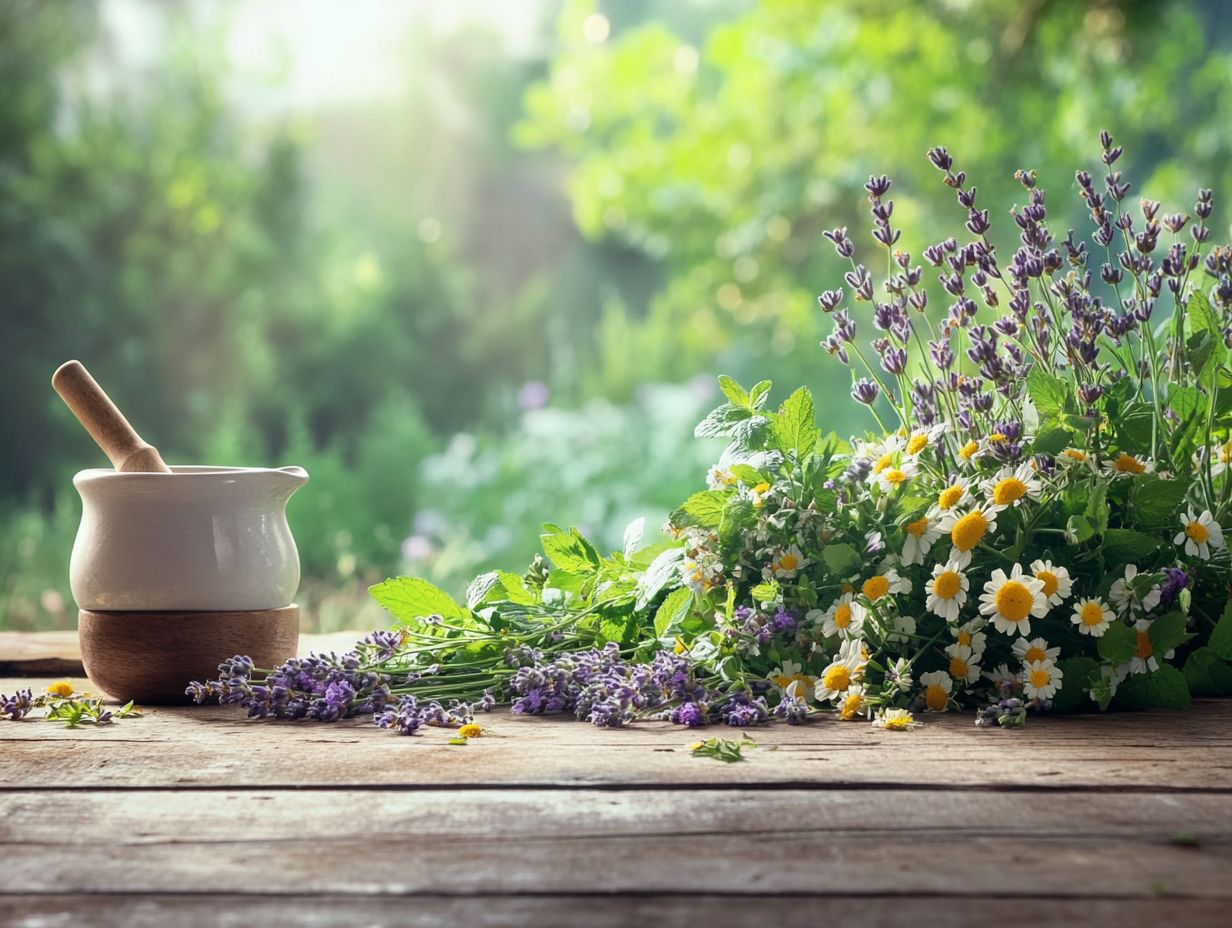
Herbs for anxiety can have a calming effect on both the mind and body. They help reduce stress and tension, promote relaxation, and improve overall mental well-being.
What are some natural solutions for anxiety using herbs?
Natural solutions for anxiety include drinking herbal teas like chamomile and lavender. You can also use essential oils, such as bergamot and frankincense, or take herbal supplements like valerian root and ashwagandha.
Are there any side effects of using herbs for anxiety?
Many herbs for anxiety are safe and effective! However, always consult a healthcare professional before trying new herbs, especially if you’re on medication or have preexisting conditions.
How do herbs for anxiety work?
Herbs for anxiety interact with the body’s chemicals that regulate mood and stress response. They can also directly affect the nervous system, promoting relaxation and reducing feelings of anxiety.
Can herbs for anxiety be used in combination with other treatments?
Yes, herbs for anxiety can be used alongside therapy and medication. Discuss with a healthcare professional to ensure safe and effective use of herbs with other treatments.
What are some popular herbs for anxiety and how do I use them?
Some popular herbs for anxiety include passionflower, lemon balm, and kava. These can be consumed as teas, tinctures, or capsules. Follow recommended dosages for proper use.
Explore the Benefits of Herbs!
Discover how these natural remedies can help you manage anxiety. Always consult with a healthcare provider to find the best approach for your needs.

